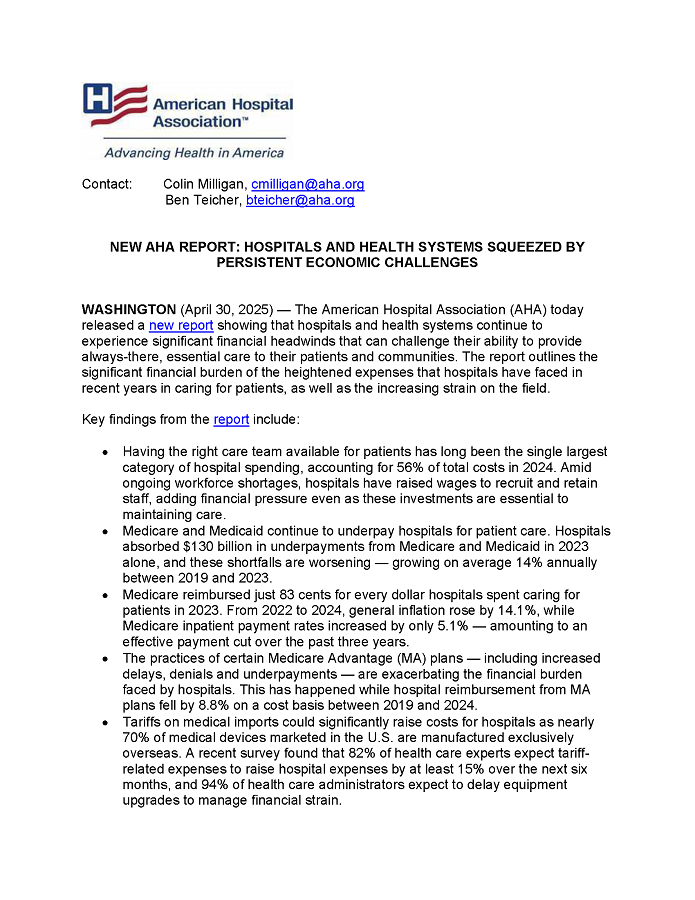

New AHA Report: Hospitals and Health Systems Squeezed by Persistent Economic Challenges
Contact:
Colin Milligan, cmilligan@aha.org
Ben Teicher, bteicher@aha.org
WASHINGTON (April 30, 2025) — The American Hospital Association (AHA) today released a new report showing that hospitals and health systems continue to experience significant financial headwinds that can challenge their ability to provide always-there, essential care to their patients and communities. The report outlines the significant financial burden of the heightened expenses that hospitals have faced in recent years in caring for patients, as well as the increasing strain on the field.
Key findings from the report include:
- Having the right care team available for patients has long been the single largest category of hospital spending, accounting for 56% of total costs in 2024. Amid ongoing workforce shortages, hospitals have raised wages to recruit and retain staff, adding financial pressure even as these investments are essential to maintaining care.
- Medicare and Medicaid continue to underpay hospitals for patient care. Hospitals absorbed $130 billion in underpayments from Medicare and Medicaid in 2023 alone, and these shortfalls are worsening — growing on average 14% annually between 2019 and 2023.
- Medicare reimbursed just 83 cents for every dollar hospitals spent caring for patients in 2023. From 2022 to 2024, general inflation rose by 14.1%, while Medicare inpatient payment rates increased by only 5.1% — amounting to an effective payment cut over the past three years.
- The practices of certain Medicare Advantage (MA) plans — including increased delays, denials and underpayments — are exacerbating the financial burden faced by hospitals. This has happened while hospital reimbursement from MA plans fell by 8.8% on a cost basis between 2019 and 2024.
- Tariffs on medical imports could significantly raise costs for hospitals as nearly 70% of medical devices marketed in the U.S. are manufactured exclusively overseas. A recent survey found that 82% of health care experts expect tariff-related expenses to raise hospital expenses by at least 15% over the next six months, and 94% of health care administrators expect to delay equipment upgrades to manage financial strain.
At the same time, Congress is considering proposals that would cut Medicaid, Medicare and other programs that support the 24/7 care and services that hospitals provide to patients in every community across America.
“This report should serve as an alarm bell that a perfect storm of rising costs, inadequate reimbursement, and certain corporate insurer practices are jeopardizing the ability of hospitals to deliver high-quality, timely care to their communities,” said AHA President and CEO Rick Pollack. “With so much at stake, policymakers must recommit to making preserving access to hospital care a national priority.”
View the full report. See the AHA’s advocacy agenda for more information on the AHA's efforts to support hospitals and health systems.
###
About the American Hospital Association (AHA)
The American Hospital Association (AHA) is a not-for-profit association of health care provider organizations and individuals that are committed to the health improvement of their communities. The AHA advocates on behalf of our nearly 5,000 member hospitals, health systems and other health care organizations, our clinician partners – including more than 270,000 affiliated physicians, 2 million nurses and other caregivers – and the 43,000 health care leaders who belong to our professional membership groups. Founded in 1898, the AHA provides insight and education for health care leaders and is a source of information on health care issues and trends. For more information, visit the AHA website at www.aha.org.

